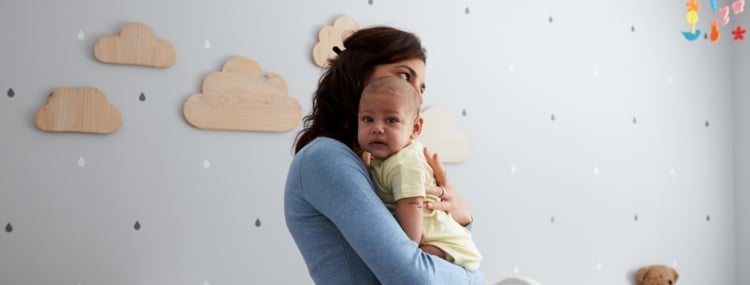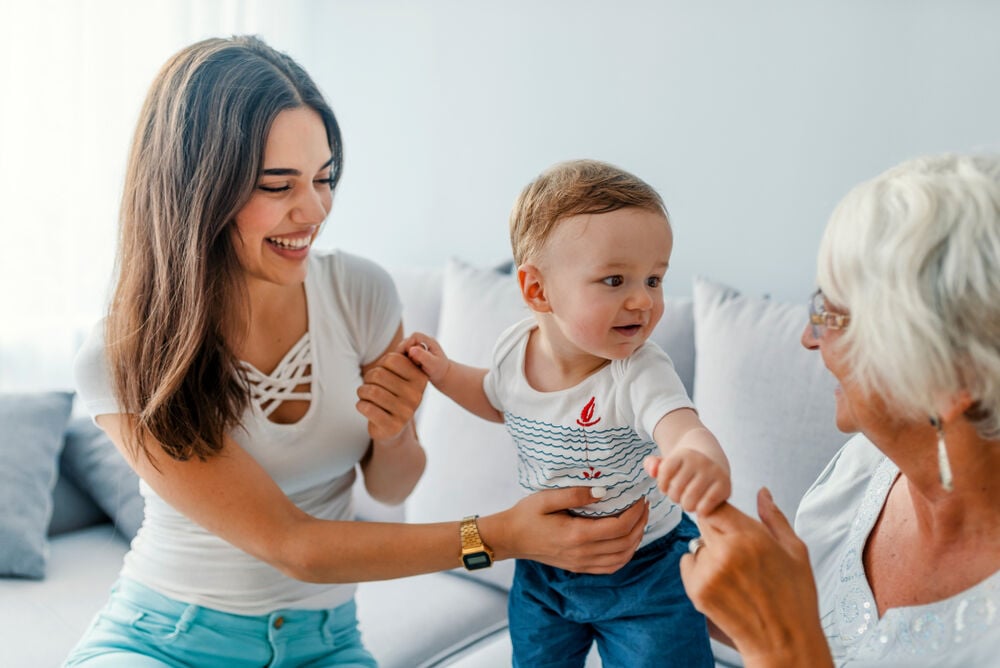All children have varying levels of stranger anxiety, and it's completely normal for them to cry or become fussy when an unfamiliar person holds them or spends time with them. Learn all about baby's stranger anxiety, including what it involves and when you can expect for it to subside.
-
Tracking cycle
-
Getting pregnant
-
Pregnancy
-
Help Center
-
Flo for Partners
-
Anonymous Mode
-
Flo app reviews
-
Flo Premium New
-
Secret Chats New
-
Symptom Checker New
-
Your cycle
-
Health 360°
-
Getting pregnant
-
Pregnancy
-
Being a mom
-
LGBTQ+
-
Quizzes
-
Ovulation calculator
-
hCG calculator
-
Pregnancy test calculator
-
Menstrual cycle calculator
-
Period calculator
-
Implantation calculator
-
Pregnancy weeks to months calculator
-
Pregnancy due date calculator
-
IVF and FET due date calculator
-
Due date calculator by ultrasound
-
Medical Affairs
-
Science & Research
-
Pass It On Project New
-
Privacy Portal
-
Press Center
-
Flo Accuracy
-
Careers
-
Contact Us
When Does Baby Stranger Anxiety Start? The Guide


Every piece of content at Flo Health adheres to the highest editorial standards for language, style, and medical accuracy. To learn what we do to deliver the best health and lifestyle insights to you, check out our content review principles.
What is stranger anxiety?
An infant learns to recognize their parents within their first few months of life by sight, sound, and smell. And until they're about 6 months old, babies usually seem interested in other adults as well and may sometimes engage with them in fun games or cooing and laughing.
After 6 months, some children undergo a period of what's called stranger anxiety, where they feel unhappy and frightened around any adult except for their parents. For instance, the child may burst into tears or shrieking if someone they're unfamiliar with makes eye contact or holds them.
Parents should know that stranger anxiety is a normal part of a child's cognitive development. Children can have stranger anxiety feelings until they're 2 years old. Separation anxiety, another normal behavior, also develops during this period.
Both of these stages, stranger anxiety and separation anxiety, happen because your baby is reaching a stage of cognitive development where they can recognize faces other than their parents'. Naturally, children have a strong preference for faces they recognize, and if they're in a situation where they can't see or be with you, developmentally they think you're not around (even though you're nearby), which results in crying and becoming upset.
It's important to know that stranger anxiety and separation anxiety are not an indicator of emotional problems but rather of typical mental development.
Babies' stranger anxiety: age
While most child development specialists believe that stranger anxiety begins around 6 to 9 months, depending on the child, infants can also react in anxious ways to strangers, especially if they're picked up suddenly or by someone unfamiliar. Another possible provocation is people who look different to them, such as if they have a beard or glasses.
Stranger anxiety can last until a child is 2 years old, or even later, but it varies depending on the child's personality and temperament.
Common problems associated with stranger anxiety
A baby or child's stranger anxiety can be upsetting for family friends or relatives, who might feel dismissed by a shy child, and they may feel guilty or think it's because of something they did wrong.
Your baby might reject a caregiver they've previously been comfortable with, or they might pitch a fit when relatives come to visit. All of these scenarios can be frustrating for the parents, who may want to enjoy spending time with family.
Perhaps the best thing about stranger anxiety is that it doesn't last forever. At some point, children outgrow their fear of strangers. Kids with a shy personality may continue to be that way, but they aren't likely to react in overly negative ways, such as crying or screaming, at the sight of an unfamiliar person.
Stranger anxiety in infants and babies: treatment
Most incidents of stranger anxiety in children don't require treatment because it's a phase they eventually grow out of.
To try to reduce stressful outbursts, friends or relatives who may be unfamiliar to your baby can try different approaches to greeting your baby, such as approaching them while speaking softly, smiling, and holding a toy. This doesn't always work though because even if someone has the best intentions, your baby can still react in unexpected ways.
What you can do to minimize stranger anxiety

Here are some tips for helping your child feel less upset when meeting a new person for the first time, such as a friend of yours, relative, or caregiver.
- Provide a chance for your baby or child to meet new people in a safe, familiar, comfortable environment, such as in your own home.
- Hold your child when introducing them to new people to minimize stress.
- Take a comfort item such as a blanket or a favorite toy to events where you'll be in unfamiliar surroundings or around new people.
- If your child becomes upset around a visitor, comfort them and provide a bit of distance between them and the new person while engaging in a mutual activity. Later, after baby has calmed down, you can try again.
- If you've hired a babysitter, have them arrive early so you can spend time with them and your baby before you leave.
- Your baby is going to watch for cues from you, so be sure to act friendly and send a message to your child that this person is safe and that you like and trust them.
- Try not to draw out your inevitable departure. Prolonging it only makes your child more upset.
- Remember: Don't dismiss or ignore your child's fear of unfamiliar people. This can increase their anxiety levels and make the situation worse.
Take a quiz
Find out what you can do with our Health Assistant
Have patience when it comes to stranger anxiety
Although it's difficult, it's important to be patient with your child, even though it seems exhausting. Try not to rush them into meeting new people before they're ready. And when you're introducing your infant to adult friends or relatives who may instinctively want to pick them up upon seeing them, give your child time to become comfortable to avoid triggering stranger anxiety outbursts.
When to consider calling the doctor
As we've stated, it's normal for children to have anxiety about new individuals and unfamiliar people in the toddler and infancy years, but should parents be concerned if these behaviors persist into the preschool years?
The answer is complicated because it depends a lot on your child's personality, the intensity of their response, and whether it stays consistent over time.
For example, it's common for preschoolers to have stranger anxiety and separation anxiety from you during the first few weeks of preschool in a new setting. But typically this doesn't last too long, usually not more than a week or two.
However, if children continue to show distress and anxiety upon meeting new people to the point where it's interfering with their social development, then it might be time to discuss options with your pediatrician, which might include a psychiatrist referral.
Stranger anxiety is entirely normal for babies and young children. Even though it's frustrating, just remember it will pass, like so many other things in your child's development. Try to be patient, stay positive, and support your child the best you can until they've outgrown it.


Hey, I'm Anique
I started using Flo app to track my period and ovulation because we wanted to have a baby.


The Flo app helped me learn about my body and spot ovulation signs during our conception journey.


I vividly
remember the day
that we switched
Flo into
Pregnancy Mode — it was
such a special
moment.
Real stories, real results
Learn how the Flo app became an amazing cheerleader for us on our conception journey.




